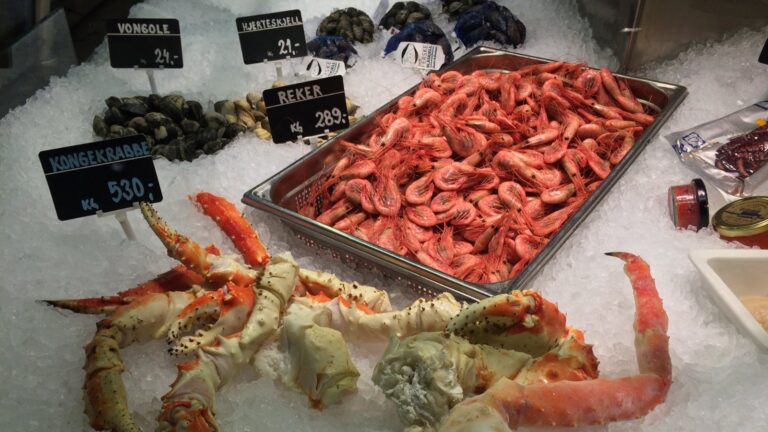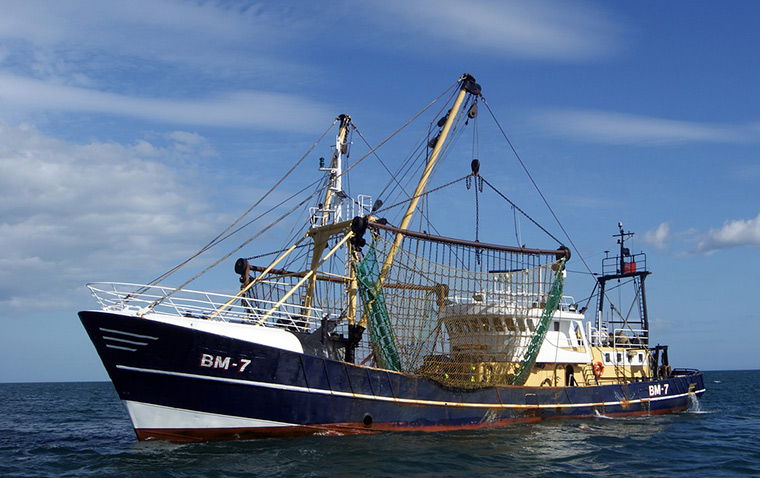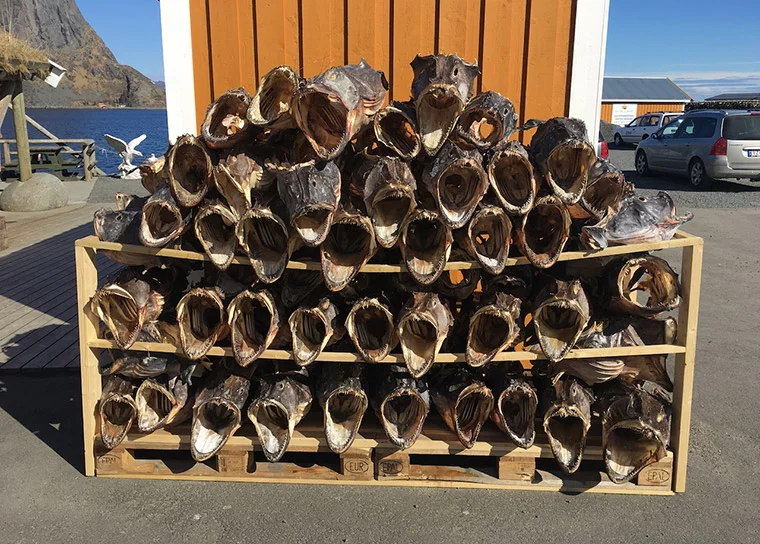Seafood jobs in Norway are not easy, but they offer decent pay and a chance to get a foothold in the job market. They’re particularly suited to those looking for short-term or seasonal work, or anyone with previous experience in production environments.
Seafood is Norway’s second-largest export industry after oil and gas, encompassing everything from traditional fishing to modern fish farming and large-scale processing.

Despite automation and industry consolidation reducing the total number of roles in recent years, seafood remains an important source of employment especially in rural parts of the country.
An Evolving Industry
The industry has changed significantly in recent decades. Traditional fishing boats still exist, but large trawlers capable of processing fish on board are now more common.
This development, combined with stricter quotas and advances in technology, has led to a decline in the number of onshore processing plants. Many smaller facilities have either closed or merged into larger, more efficient year-round operations.
Fish farming has also grown into a major component of the industry. Salmon is the best-known product, but Norway farms other species too, particularly along the fjord-lined coast, and, increasingly onshore.
Aquaculture companies often operate processing and packaging facilities in close proximity to the farms themselves, creating opportunities for onshore workers.
Type & Location of Seafood Industry Jobs
Seafood jobs in Norway typically involve hard, physical labour. Roles in processing plants often include tasks such as slaughtering, cleaning, and packing fish. These jobs can be repetitive, physically demanding, and are usually carried out in cold, damp conditions.

Working hours can be long and often include nights and weekends. While not glamorous, the work suits those who are adaptable, physically fit, and looking for reliable income, even if only temporarily.
Because demand for seafood products can vary, many jobs are seasonal. However, some of the larger factories operate year-round and offer permanent contracts for the right candidates.
As you might expect, most seafood jobs are located along the Norwegian coast. Many positions are based in smaller towns and rural areas, far from major cities. Due to this, companies often provide accommodation for seasonal or international workers. This is usually in the form of shared housing.
Public transport in these areas can be limited. While it’s not always essential to have your own car, being able to drive will certainly increase your options and flexibility.
Language and Experience Requirements
Fluency in Norwegian is not always required, especially in onshore jobs. Many processing facilities have international teams and use English as the main working language.
However, understanding basic Norwegian can be helpful and may improve your chances of being hired or advancing to more senior roles.
For work on fishing boats, the situation is different. In these environments, understanding Norwegian is essential for safety reasons and is usually a non-negotiable requirement.
Previous experience in seafood processing or related factory work is desirable but not always essential. Most companies provide on-the-job training and are mainly looking for reliable workers who can handle repetitive tasks, follow strict hygiene procedures, and work as part of a team.

For certain roles, industry-specific certification may be required, particularly where heavy machinery is involved.
Pay and Working Conditions
Norway does not have a national minimum wage, but the seafood industry is covered by a collective agreement that sets standard pay levels.
Following the 2024 wage settlement between Sjømat Norge and the Norwegian Food and Allied Workers Union (NNN), new minimum rates came into effect on 1 May 2024. The standard minimum hourly wage is now NOK 216.15, an increase that includes a general supplement of NOK 7.00.
Workers with formal trade certification (fagbrev) receive an additional NOK 12.00 per hour, following a NOK 1.00 increase to the previous supplement.
There are also increased bonuses for seniority: NOK 1.50 extra after one year and NOK 0.50 extra after three years, both now applied with outgoing effect, meaning the supplement applies to all workers already at that level, not just new recipients.
These rates apply to all employees, regardless of nationality or union membership. Additional pay applies for overtime, night shifts, and weekend work. For instance, shift work typically brings a supplement of 20 to 25 percent.
Some companies also offer performance-based compensation based on output (such as per-kilo or per-unit rates) but Norwegian regulations require that overall pay must not fall below the established hourly minimum.
How to Find Work in the Seafood Industry
If you’re seeking permanent employment, the best places to start are the Norwegian Labour and Welfare Administration website (nav.no) and the job section of finn.no.
Many seafood jobs, especially seasonal ones, are not widely advertised. Recruitment often happens months in advance and sometimes through personal or professional networks.
It’s common for companies to hire returning workers from previous seasons or to recruit through international agencies familiar with the sector. Flexibility and persistence are important, particularly if you’re applying from abroad.
Who Can Apply?
Your eligibility to work in Norway will depend on your citizenship. If you are from an EU or EEA country, you have the right to live and work in Norway without applying for a work permit. This makes EU/EEA citizens the most likely to be hired, all else being equal.
If you are from outside the EU/EEA, your chances depend heavily on your background. You will usually need a residence permit based on work or family immigration, or highly relevant industry experience.
In most cases, employers are not able to sponsor work visas for seasonal or entry-level positions in this industry.
This article is intended as a general guide only. We are not a recruitment agency and cannot assist with job applications. For more in-depth guidance, take a look at our book How to Find a Job in Norway, which is packed with practical advice on navigating the Norwegian employment market.


Hi how do I find and get a job on a fishing boat in Stavanger I’ve been on the water all my life just moved here to be with my native girlfriend and need to work.
Hey, I read that you are looking for a job on a fishing boat, so I wonder if you have found or are still looking, I am also looking for the same so I am interested in your experience?
Hello. I am a permanent resident in Finland. Would it be difficult for me to get a job in Norway?
Dear sir/madam.,
My name is Daya Shankar from india.I am a seaman have one year experienced in general cargo ship .Now i am working in a fishing vessel in iran as a post of dackhand the last 9 month.Sir if you have a vacancy or if you know any vacancy suitable for me in merchant or fishing vessel please suggest me.
I am looking for a job cutting Cod tongue. Can you suggest some companies that do that in Norway. Links?
Hi my name is Ian Hlophe, I’m a south African and I’m looking to find a job on the fishing boat. I have a friend in Norway and he is currently here in south Africa with me. I have experience in business management but I’m look to start at the bottom and learn. My friend will provide me with a place to stay, how do I go about finding a job?.
Hi my name is Ian Hlophe I’m a south African, I’m looking to find a job on the fishing boat. I have a business management experience but I’m willing to start at the bottom and learn. How do I find the job.
I’m just wondering if there are any company looking for any filleters , I cut cod haddock salmon plaice and many more in Grimsby uk